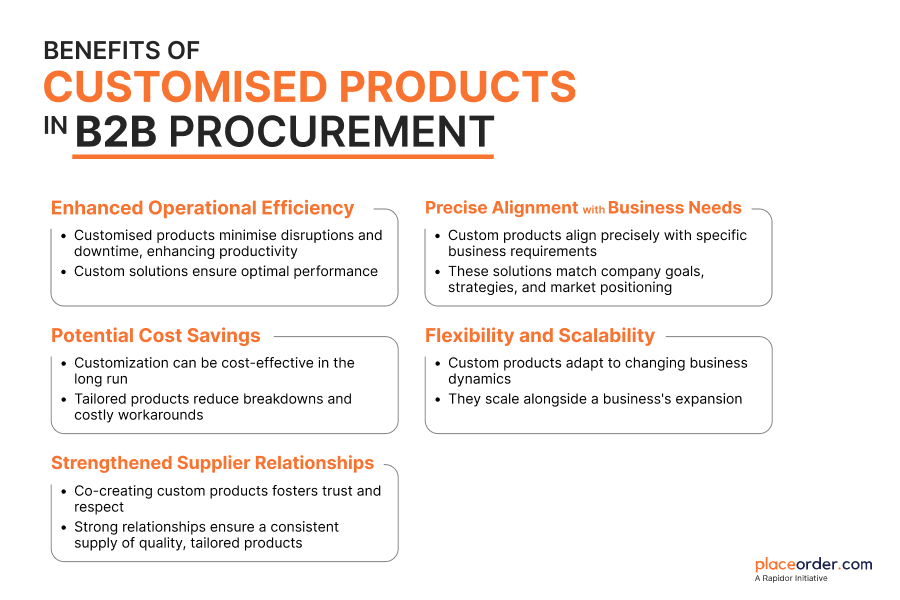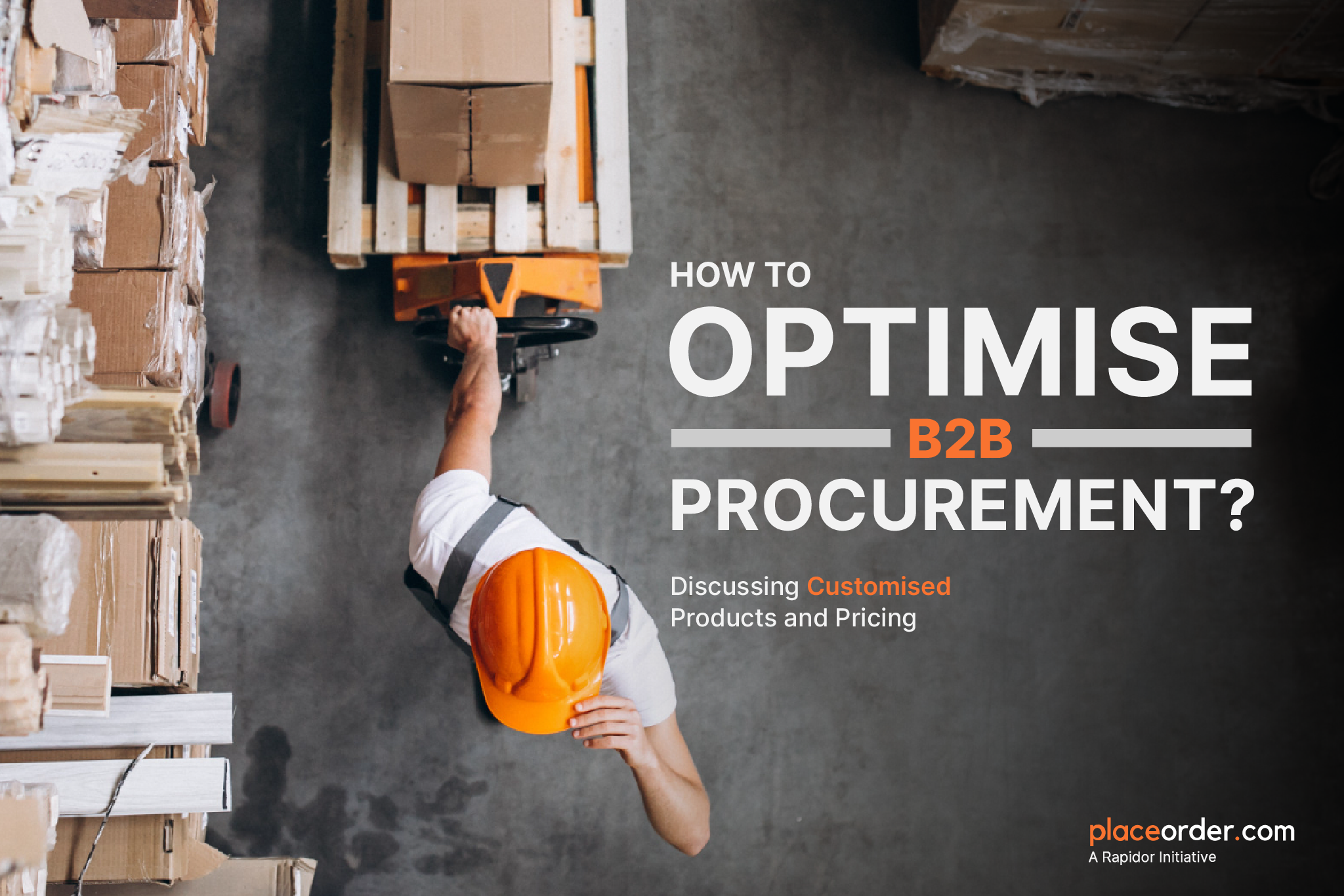In the vast landscape of B2B commerce, procurement has often been a linchpin that determines the efficiency, cost-effectiveness, and ultimate success of a business operation.
However, as the B2B commerce ecosystem evolves, especially in regions such as India, there is a noticeable shift towards more personalised solutions. A trend that’s gaining significant traction is the move towards customised products and customised pricing in B2B procurement.
This change isn’t just a mere industry fad; it’s a strategic response to the inherent limitations of traditional procurement methods. The power of customization is compelling.
In this blog, we’ll discuss potential of customised products and pricing in B2B procurement, shedding light on how businesses can recalibrate their sourcing strategies to be more aligned, efficient, and cost-effective.
For procurement managers, supply chain executives, and decision-makers navigating the complex waters of B2B commerce in India and beyond, this exploration offers a roadmap to procurement optimization.
How will Customisation Change the Market?
Traditionally, B2B procurement has adhered to a standard, leading organisations into a one-size-fits-all model. This method, while streamlined, often poses significant challenges in terms of flexibility, cost efficiencies, and meeting the unique needs of individual businesses.
By tailoring products and pricing structures to the specific needs and requirements of B2B clients, companies achieve better alignment with their business goals and foster stronger, value-driven supplier relationships. This movement is not just about optimising costs, but also about ensuring that the sourced products or services fit seamlessly into the business’s operations, strategy, and vision.
What are the Limitations of One-Size-Fits-All Procurement?
In the fast-paced world of B2B commerce, adaptability and specificity are paramount. Businesses today have unique operational nuances, varying strategic goals, and distinct market demands.
Yet, surprisingly, many are still reliant on traditional one-size-fits-all procurement models. While these models might have been the industry norm in the past, their limitations are becoming increasingly evident in today’s complex and dynamic B2B landscape.
Mismatched Product Offerings
At the core of the one-size-fits-all approach lies the idea of generic products. These are products that are produced en masse, aiming to meet the ‘average’ requirements of businesses.
However, what happens when a business’s needs are not ‘average’?
The lack of customization can lead to a significant mismatch between what is procured and what is genuinely needed. This misalignment can result in wastage, inefficient operations, and even the potential loss of business opportunities.
For instance, a manufacturer procuring generic components may find they don’t perfectly fit into their unique product design, leading to production delays or subpar end-products.
Rigid Pricing Structures
One of the most significant drawbacks of traditional procurement is its inflexible pricing models. Fixed pricing structures, while simple, often fail to account for the varied demands, order volumes, and specific requirements of individual businesses. This rigidity can prove costly.
A small-scale dealer, for example, may end up overpaying because the pricing model doesn’t account for reduced order quantities. On the other hand, large enterprises might miss out on bulk purchase discounts that a more flexible, customised pricing model could offer.
Inefficient Financial Planning
With the constraints of the one-size-fits-all model, businesses often find themselves unable to strategize their financial planning optimally. Being locked into rigid pricing means there’s less room for negotiation, less flexibility in cash flow management, and challenges in predicting costs.
This lack of financial agility can place undue strain on a business, especially in the ever-fluctuating B2B commerce markets in regions like India.
Transactional, Not Relational
Traditional procurement methods, with their standardised approach, often push businesses into purely transactional engagements with their suppliers. This method misses out on the deeper, value-driven relationships that can be nurtured through more customised interactions.
Building relationships based on understanding specific needs and delivering tailored solutions fosters trust, loyalty, and long-term business partnerships.
How did Customised Procurement Come About?
In the intricate maze of B2B commerce, customization has emerged as a beacon of innovation and adaptability. As businesses yearn for solutions tailored to their specific needs, the traditional moulds of procurement are being shattered, making way for a more nuanced, personalised approach.
Let’s delve into what customised procurement entails and how it stands in stark contrast to the age-old traditional methods.
How can We Define Customised Products in B2B Procurement?
Unlike generic products churned out for the ‘average’ business, customised products are meticulously crafted or modified to meet the precise needs of a specific business. This approach considers various factors like the business’s operational nuances, market demands, and long-term strategic goals.
For instance, a distributor in the B2B commerce sector in India might require specific modifications to an electronic component to cater to regional market demands. Customised procurement would enable sourcing such a tailored component, ensuring the distributor can cater to its market effectively and efficiently.
How has Customised Pricing Evolved?
Beyond product customization, there’s a transformative shift occurring in the realm of pricing. Customised pricing moves away from the rigidity of fixed pricing structures and embraces a more dynamic model. This approach takes into account variables like order volumes, long-term contracts, and specific service add-ons.
For a manufacturer, customised pricing might mean getting a discount for bulk orders or a special rate for recurring business. Such pricing models nurture a more strategic financial planning process, allowing businesses to optimise their costs based on their unique procurement patterns.
Why Should You Diverge from Traditional Methods?
The traditional procurement paradigm largely revolved around mass-produced products and fixed pricing tables. The underlying philosophy was simplicity and predictability. However, as the B2B landscape became more diverse and complex, these methods started showing their limitations.
Customised procurement, on the other hand, prioritises adaptability and precision. It acknowledges that every business is unique, with its own set of challenges and requirements.
By allowing for customised products and customised pricing, this approach offers businesses the agility to navigate their specific market conditions, operational challenges, and growth aspirations.
Creating Value-Driven Engagements
One of the most profound shifts brought about by customised procurement is the transition from transactional to value-driven engagements. When suppliers and businesses collaborate to create tailored solutions, it fosters a deeper understanding and mutual respect.
Such engagements are not just about fulfilling an order but about creating solutions that add tangible value to the business, enhancing its market positioning and competitive edge.

What are the Benefits of Customised Products in B2B Procurement?
The evolution of B2B commerce, especially in burgeoning markets like India, has brought forth the need for more specialised and tailored solutions. One of the most prominent shifts we’re witnessing is the surge in demand for customised products in B2B procurement.
But what is driving this demand? Simply put, the numerous advantages these tailored solutions bring to the table.
Let’s explore some of the most significant benefits that stem from this trend.
Enhanced Operational Efficiency
Customised products, designed or modified to meet a business’s specific requirements, invariably lead to more streamlined operations. The right fit minimises disruptions, reduces downtimes, and optimises productivity.
It’s akin to having a suit tailored to your measurements; the fit is impeccable, ensuring you function at your best.
Precise Alignment with Business Needs
Generic products, by their very nature, cater to a broader audience. However, in the world of B2B procurement, such a scattergun approach can often miss the mark.
Customised products, on the other hand, are laser-focused on a business’s specific needs. This precision ensures that the products procured not only serve their intended purpose but also align perfectly with the company’s goals, strategy, and market positioning.
Potential Cost Savings
On the surface, customised solutions might seem more expensive than off-the-shelf products. However, when one factors in the total cost of ownership, the scales often tip in favour of customization.
Think about it: a product tailored to a business’s needs reduces the chances of malfunctions, the need for frequent replacements, or costly workarounds. Over time, these savings add up, making customised products a more cost-effective choice in the long run.
Flexibility and Scalability
The B2B landscape is dynamic, with businesses continually evolving and scaling. Customised products offer the agility to adapt to these changes. Whether it’s modifying a component to cater to increased production demands or tweaking a software solution to integrate new features, customised products are inherently more adaptable.
This flexibility ensures that as a business grows, its procured products can scale alongside it.
Strengthened Supplier Relationships
When businesses and suppliers collaborate to create tailored products, it paves the way for stronger, more value-driven relationships. It’s not just about a transaction; it’s about understanding, collaboration, and co-creation.
Such engagements foster trust, mutual respect, and often lead to long-term partnerships, ensuring a consistent supply of high-quality, tailored products.
What are the Perks of Customised Pricing Models?
The B2B commerce realm, especially in dynamic markets like India, demands more than just quality products. As significant as the product itself is the pricing strategy behind it.
While the traditional fixed pricing models have had their time in the spotlight, modern B2B commerce is gravitating towards customised pricing models. But what makes these flexible pricing strategies so appealing?
Let’s break down the distinct advantages they offer to businesses.
Financial Flexibility
One of the most immediate benefits of customised pricing is the financial flexibility it provides. Unlike rigid pricing structures that pigeonhole businesses into predefined brackets, customised pricing allows for negotiations based on volume, frequency, and unique requirements.
Whether it’s a discount for bulk orders or a special rate for a long-term partnership, this flexibility ensures that businesses can make procurement decisions that align with their financial strategies.
Precision in Financial Planning
Customised pricing models provide businesses with predictability and control over their expenditures. By tailoring pricing to a company’s specific procurement patterns, businesses can forecast expenses more accurately.
This precision plays a pivotal role in budgeting, cash flow management, and overall financial planning, ensuring that there are no unpleasant financial surprises down the road.
Value-Driven Engagements
Customised pricing isn’t just about the numbers; it’s about recognizing and rewarding value. When suppliers offer pricing models tailored to a business’s unique needs, it signals a deeper understanding and appreciation of the partnership.
Such value-driven engagements go beyond mere transactions, fostering trust, loyalty, and a shared commitment to mutual growth.
Competitive Advantage
In the cutthroat world of B2B commerce, even the slightest edge can make a significant difference. Customised pricing models can provide this edge.
By ensuring that businesses get the best possible value for their investment, they can achieve better profit margins, invest in growth, and ultimately outpace competitors.
Scalability for Future Growth
As businesses evolve, so do their procurement needs and financial strategies. Customised pricing models, with their inherent flexibility, can adapt to these changing dynamics.
Whether a business is expanding its operations, entering new markets, or pivoting its strategy, a tailored pricing model can evolve in tandem, supporting the company’s journey every step of the way.
What Changes Can We Expect In B2B Commerce?
The world of B2B commerce is in a state of flux, shaped by evolving market demands, technological advancements, and businesses’ incessant quest for optimization.
One of the most profound shifts we’ve witnessed in recent times is the move away from the traditional one-size-fits-all approach towards a more personalised, strategic methodology. The rise of customised products and customised pricing models.
Throughout our discussion, a few salient points have emerged:
- Customised Products offer unparalleled operational efficiency, aligning closely with specific business needs and providing the agility required in today’s dynamic markets.
- Customised Pricing Models present a transformative approach to financial planning and procurement. They provide businesses the flexibility to navigate financial intricacies, foster value-driven engagements, and ultimately attain a competitive edge.
As the intricacies of B2B commerce in India and globally become more pronounced, the limitations of traditional procurement methods are being laid bare. In contrast, the advantages of customization stand out as beacons of innovation and value.
Ready to Take the Next Steps?
Are your methods aligning with the evolving demands of modern B2B commerce? Are you harnessing the full potential of customised solutions?
The future of B2B procurement beckons with promise, and it’s intrinsically tied to customization. By embracing tailored products and pricing strategies, businesses not only position themselves for operational excellence but also unlock doors to sustainable growth and lasting success.
In the evolving tapestry of B2B commerce, it could very well be the thread that weaves together your organisation’s success story.

